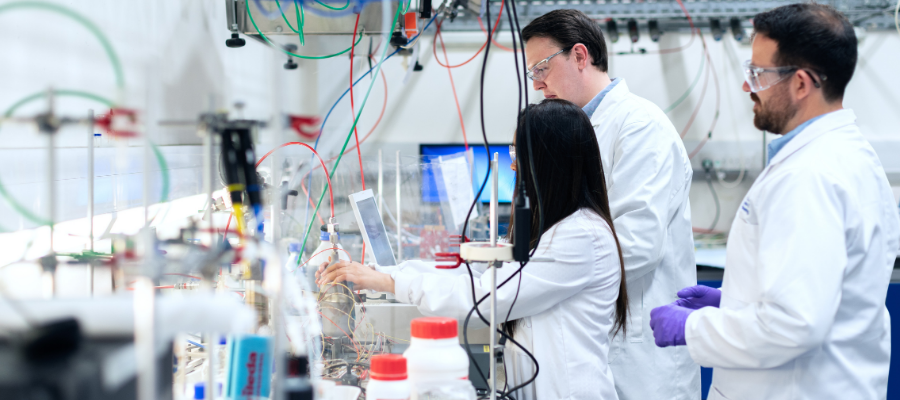| Program | Description |
|---|---|
| Microprogram | Upgrade or deepen your knowledge in a specific field |
| Graduate studies diploma | Focus on the practical aspects of learning through lectures, directed research and internships |
| Master's with thesis | Combines graduate coursework with thesis research |
| Master's with coursework | Ideal for those who want to expand their knowledge or develop career-related skills while continuing to work full time |
| Master's with project | Similar to the master's by coursework, but a research project replaces one or two courses |
| Master's with online delivery | Ideal for those who want flexible, 100% online delivery with no on-campus presence required |
| PhD | Ideal for those considering careers in teaching or in research in a private or public setting. Graduates will acquire independence in conducting research and in preparing scholarly publications |
Graduate programs
Explore our diverse array of cutting-edge disciplines, from advanced materials to sustainable energy solutions, tailored to fuel your passion for engineering. Join a vibrant community of scholars and researchers committed to pushing the boundaries of technological advancement, and embark on a transformative journey towards shaping the future of engineering.
Types of graduate programs
Programs by discipline

Advanced Material Manufacturing
With a primary focus on materials, the program enables graduates to meet manufacturing challenges related to a broad range of mechanical, armour, energy, aeronautical, naval, thermal and biomedical systems and devices. This broad-based area of engineering holds career opportunities in almost every industrial sector, including high tech, aerospace, automotive, defence, energy, biomedical and consulting.

Biomedical Engineering
The Ottawa–Carleton Institute for Biomedical Engineering (OCIBME) offers a multi-disciplinary graduate program and four main research fields—medical instrumentation, biomedical image processing, biomechanics and biomaterials and medical informatics and telemedicine.

Chemical Engineering
The main objective of the master’s programs from the Department of Chemical and Biological Engineering is to refine the skills and research expertise of the students by expanding their specialized knowledge of chemical engineering, primarily through coursework, research seminars and technical training.

Civil Engineering
Civil engineers have a direct impact on society through the design and construction of the nation’s infrastructure—buildings, highways, railroads, bridges, airports, dams, tunnels, pipelines, municipal services, water resource systems and more. Civil engineering is perhaps the broadest field in terms of engineering professions.

Computer Science
Students who wish to pursue graduate studies in computer science can do so in joint programs offered by the University of Ottawa’s School of Electrical Engineering and Computer Science (EECS) and Carleton’s School of Computer Science (SCS) under the auspices of the Ottawa–Carleton Institute for Computer Science (OCICS).

Digital Transformation and Innovation
The Digital Transformation and Innovation program is a multi-faculty collaboration between the Telfer School of Management, the Faculty of Arts, and the Faculty of Engineering to train highly qualified professionals to create, manage and research the profound change to our world that is happening as a result of electronic digital technology.

Electrical and Computer Engineering
Delivered through the Ottawa–Carleton Institute for Electrical and Computer Engineering (OCIECE), the electrical and computer engineering programs benefit from the combined research strengths of uOttawa’s School of Electrical Engineering and Computer Science (EECS) at and Carleton’s electronics department and systems and computer engineering department.

Entrepreneurial Engineering Design
The Masters of Engineering in Entrepreneurial Engineering Design provides advanced training and mentorship in engineering design in the context of entrepreneurship. The focus of the program is on the design of new products or technology that will be commercialized or made available to have community impact for engineers who aspire to start companies.

Engineering Management
The purpose of the master’s degree in engineering management is to introduce the graduate with two or more years of engineering experience and who is interested in a career in management to the foundations of management knowledge and skills. The program is designed for engineers of all disciplines who are currently, or aspire to be, team or project leaders, section leaders or managers.

Environmental Engineering
Research areas include air pollution, water resources management, groundwater management, contaminant transport, pollution prevention, water and wastewater treatment, environmental impact assessment and management of solid, hazardous and radioactive waste.

Mechanical Engineering
Mechanical engineers are responsible for a wide range of mechanical, energy, aeronautical, naval, thermal and biomedical systems and devices—from computer parts to power plants, manufacturing systems and spacecraft. This is a broad-based area of engineering with career opportunities in almost every industrial sector, including high tech, aerospace, materials, manufacturing, automotive, energy, ship building, biomedical and consulting.

Systems Science
The graduate program in system science is an interdisciplinary program drawing on contributions from the School of Electrical Engineering and Computer Science, Department of Economics, Telfer School of Management and Department of Mathematics and Statistics. The program offers numerous opportunities to study complex systems in nature, society and science itself, aiming to develop interdisciplinary foundations that are applicable in a variety of areas, such as engineering, business and the social sciences.



